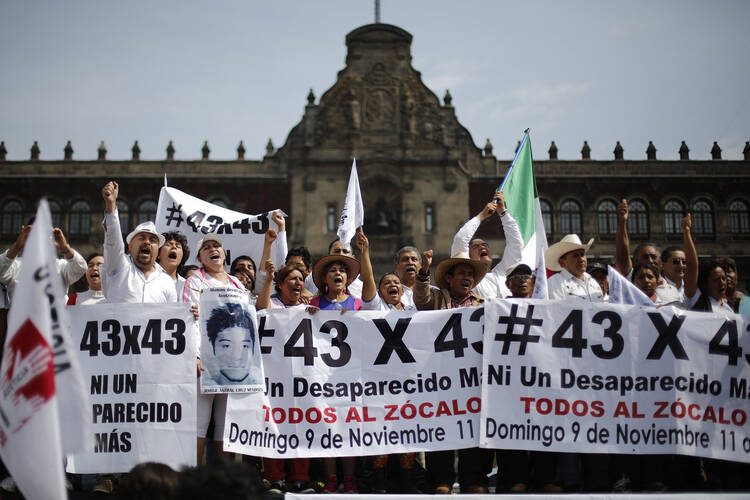Some Mexicans used Ash Wednesday to rebuke authorities who insist that 43 students were kidnapped, killed and then had their bodies burned in a garbage dump and ashes tossed in a river.
Classmates and families of the missing students reject the explanation of what happened. So on Feb. 18, in predominantly Catholic Mexico, instead of having crosses of ashes on their foreheads, some people marked the number "43," took selfies and posted the photos online with the hashtag, "43NoSonCeniza" (the 43 are not ashes).
The hashtag trended most of the day in Mexico. The BBC identified the originators as an artists' collective known as "Que hacer" (What to do?), which wanted people to not forget the tragedy and express their dissatisfaction with the official investigation.
Father Hugo Valdemar Romero, spokesman for the Archdiocese of Mexico City, said someone figured using the ashes was "good idea" to protest, but "didn't know what the ashes mean" to Catholics.
"A symbol, which is very religious, cannot be used in order to take up a political banner, however just the cause," he said. "These things can't be confused."
The 43 students, teacher trainees from the state of Guerrero, were abducted in late September by police acting on the orders of a corrupt mayor and were turned over to a criminal gang, according to the Mexican attorney general's office.
Attorney General Jesus Murillo Karam first announced the findings in November and reiterated the version of events in January, calling it "the historic truth."
Families of the students say the findings are based almost entirely on statements from suspects allegedly in the employ of a gang known as Guerreros Unidos and accuse investigators of attempting to prematurely close the case. A group of Argentine forensic experts working with the families also questioned the findings and pointed to errors in the investigation.
Scientists from the National Autonomous University of Mexico, meanwhile, say the fire required to reduce the bodies to ashes could not have been ignited in the garbage dump.
One of the students has been identified from remains the attorney general's office says were recovered in the garbage dump.
The case has prompted mass protests in Mexico and caused political problems for President Enrique Pena Nieto, whose response has been tepid and approval rating has tumbled.
Archbishop Christophe Pierre, papal nuncio to Mexico, celebrated Mass in December at the Ayotzinapa teacher training school and pledged church support for the families.
On Feb. 16, Cardinal Alberto Suarez Inda of Morelia suggested in a press conference, "There is some manipulation and some political tendency, interests that are taking advantage of the parents' pain to provoke insurrections."
One of the parents, Meliton Ortega, told the Acapulco newspaper El Sur that there was no manipulation and invited the cardinal to chat about their struggle.








